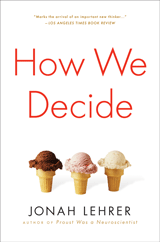I've written before about the importance of daydreaming and the so-called default, or resting state network, which seems to underlie some important features of human cognition. Instead of being shackled to our immediate surroundings and sensations, the daydreaming mind is free to engage in abstract thought and imaginative ramblings and interesting counterfactuals. As a result, we're able to envision things that don't actually exist.
Of course, this new research conflicts with the bad reputation of mind wandering. Children in school are encouraged to stop daydreaming and "focus," and wandering minds are often cited as a leading cause of traffic accidents. In a culture obsessed with efficiency, daydreaming is derided as a lazy habit or a lack of discipline, the kind of thinking we rely on when we don't really want to think.
However, in the latest edition of Mind Matters, Susan Whitfield-Gabrieli and John Gabrieli of MIT outline some interesting new research on the link between resting state activity - the performance of the brain when it's lying still in a brain scanner, doing nothing but daydreaming - and general intelligence. It turns out that cultivating an active idle mind, or teaching yourself how to daydream effectively, might actually encourage the sort of long-range neural connections that make us smart. At the very least, it's time we stop discouraging kids from staring out the classroom window, because mind wandering isn't a waste of time:
For the first time, functional measures of the resting brain are providing new insights into network properties of the brain that are associated with IQ scores. In essence, they suggest that in smart people, distant areas of the brain communicate with each other more robustly than in less smart people.In a recent paper, researchers at the Chinese Academy of Sciences, led by Ming Song, examined how resting brain networks differ between people who have superior versus average IQ scores. They used graph theory to quantify the network properties of the brain, such as how strong the communication is among distant brain regions. A graph is a mathematical representation that is composed of nodes (or brain regions) and connections between them (functional connectivity or temporal correlations), and can be used to characterize neural networks. Like prior researchers, they found that the posterior cingulate cortex is the hub of the human brain - it is the most widely and intensively connected region of the human brain at rest. Moreover, the strength of connectivity among distant brain regions was greater in people with superior than average IQ scores. Another 2009 study came to a similar conclusion, and noted that the strongest relations between resting connectivity and IQ were observed in the frontal and parietal brain regions, which have been most associated with performance on IQ tests.
Thus, remarkably, the strength of long-distance connections in the resting brain can be related to performance on IQ tests. We are often impressed when people make creative connections between ideas - perhaps long-range connectivity in the brain empowers such mental range.







Comments (22)
This morning I was daydreaming about how well Proust Was a Neuroscientist was written (on the last chapter now) and how one of your strengths, Jonah, is how you “make creative connections between ideas.” Do you daydream often?
Also, this new research makes me wonder about the correlation between exercise and intelligence. I do an awful lot of daydreaming when I’m exercising…
I am a new fan and I look forward to reading your blog and other books.
Posted by: CRS | January 7, 2010 1:40 PM